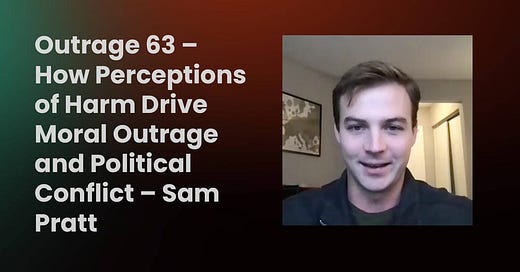Why We See Different Moral Truths: A Deep Dive into the Psychology of Morality
Morality deep dive, insights on activism vs. bridge-building, plus new This Week in Outrage episode
Why does the same event spark such wildly different reactions depending on who you ask?
Why do some people see a hero, while others see a villain?
Why do some believe an action demands justice, while others shrug it off?
At the heart of these questions lies a fundamental part of being human: morality. And it turns out, the psychology behind our moral judgments is a lot more complicated—and fascinating—than we often realize.
Recently on the Outrage Overload podcast, we spoke with psychologist Kurt Gray about his book Outraged! and explored the harm-based model of morality. That conversation offered a sweeping overview of how moral outrage emerges from our perceptions of harm and victimhood.
But this work is so central—and so rich—that it deserves more than just an overview.
In this week’s episode, we take a deeper dive.
I’m joined by Sam Pratt, one of the researchers behind the paper Morality in Our Mind and Across Cultures and Politics, to unpack the nuances of how our minds process morality, how these processes shape political polarization, and why reasonable people can come to radically different moral conclusions about the same event.
We talk about:
How moral psychology reveals common patterns underlying our outrage.
Why victimhood and morality are so intertwined—and so politically charged.
How moral relativism vs. universalism shows up in our everyday disagreements.
Why simply throwing "facts" at people almost never changes minds—and why stories of harm can.
Sam's research highlights a powerful paradox: while it often feels like we’re deeply divided on moral issues, much of that division stems from shared human concerns expressed in different ways. Beneath it all, we’re often using the same psychology of morality—we just focus on different victims, different harms, different contexts.
If we can better understand that common ground, maybe we can start to bridge some of these divides—without giving up our values or glossing over real differences.
I'd love to hear what you think—have you ever had a conversation where understanding someone's sense of "who's being harmed" shifted how you saw their view, even if you still disagreed? Hit reply and let me know.
Thanks for being part of the Outrage Overload community.
— David
More On Why We Do This Work
History warns us: when toxic polarization and dehumanization take root, they can lead societies to dark places. In rereading accounts of 1930s Germany—not to make direct comparisons, but to understand patterns—it's clear that deep social divisions, combined with the belief that certain groups were less human, helped justify unspeakable atrocities. Once people stopped seeing each other as fellow human beings, anything became permissible.
At a certain point, even those in power recognized that they had crossed lines from which there was no return, fueling a desperate "total war" mindset: if they lost, they faced consequences too great to bear. There was no way back.
Today, we are not where they were. But some of the emotional currents—intense polarization, the casual dehumanization of political rivals—feel disturbingly familiar. When we allow ourselves to see our neighbors as evil—whether that's someone blaming immigrants for all our problems, or Democrats seeing all Republicans, or even all MAGA supporters, as dangerous enemies—we step closer to that precipice.
That is why we do this work: to help rebuild the ability to see each other as human beings first. To resist the easy path of outrage, demonization, and despair. To keep the bridges standing—before it's too late.
Still Arguing About COVID?
Even years later, conversations about the pandemic remain charged—and often misinformed. If you're finding yourself in those debates, it's worth revisiting our episode Dispelling Myths of the COVID-19 Response, where we worked to lower the temperature around the pandemic by cutting through the political noise. We took a critical look at all sides, highlighting the real systemic failures—underfunded infrastructure, leadership gaps, and persistent misinformation—rather than assigning blame to political figures or parties.
And if you're wondering what's next in the conversation, stay tuned for our upcoming episode with a long COVID expert, where we’ll unpack what we’ve learned (and failed to learn) about the lingering impacts of the virus.
🎥 Can Activism and Bridge Building Coexist?
In this highlight from our recent Live Q&A event, author and depolarization expert Zach Elwood challenges a common assumption: that activism and bridge building are in conflict.
Zach argues that bridge-building principles—like listening deeply, understanding divergent narratives, and lowering the temperature—aren’t just compatible with activism, they make activism stronger.
This insight feels especially urgent today, when shouting past each other has become the norm. If we want real change, maybe it’s time to rethink how we advocate, not just what we advocate for.





